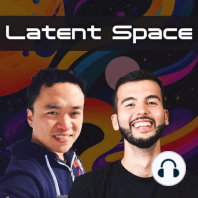52 min listen

Why AI Agents Don't Work (yet) - with Kanjun Qiu of Imbue
Why AI Agents Don't Work (yet) - with Kanjun Qiu of Imbue
ratings:
Length:
65 minutes
Released:
Oct 14, 2023
Format:
Podcast episode
Description
Thanks to the over 11,000 people who joined us for the first AI Engineer Summit! A full recap is coming, but you can 1) catch up on the fun and videos on Twitter and YouTube, 2) help us reach 1000 people for the first comprehensive State of AI Engineering survey and 3) submit projects for the new AI Engineer Foundation.See our Community page for upcoming meetups in SF, Paris, NYC, and Singapore. Last month, Imbue was crowned as AI’s newest unicorn foundation model lab, raising a $200m Series B at a >$1 billion valuation. As “stealth” foundation model companies go, Imbue (f.k.a. Generally Intelligent) has stood as an enigmatic group given they have no publicly released models to try out. However, ever since their $20m Series A last year their goal has been to “develop generally capable AI agents with human-like intelligence in order to solve problems in the real world”.From RL to Reasoning LLMsAlong with their Series A, they announced Avalon, “A Benchmark for RL Generalization Using Procedurally Generated Worlds”. Avalon is built on top of the open source Godot game engine, and is ~100x faster than Minecraft to enable fast RL benchmarking and a clear reward with adjustable game difficulty.After a while, they realized that pure RL isn’t a good path to teach reasoning and planning. The agents were able to learn mechanical things like opening complex doors, climbing, but couldn’t go to higher level tasks. A pure RL world also doesn’t include a language explanation of the agent reasoning, which made it hard to understand why it made certain decisions. That pushed the team more towards the “models for reasoning” path:“The second thing we learned is that pure reinforcement learning is not a good vehicle for planning and reasoning. So these agents were able to learn all sorts of crazy things: They could learn to climb like hand over hand in VR climbing, they could learn to open doors like very complicated, like multiple switches and a lever open the door, but they couldn't do any higher level things. And they couldn't do those lower level things consistently necessarily. And as a user, I do not want to interact with a pure reinforcement learning end to end RL agent. As a user, like I need much more control over what that agent is doing.”Inspired by Chelsea Finn’s work on SayCan at Stanford, the team pivoted to have their agents do the reasoning in natural language instead. This development parallels the large leaps in reasoning that humans have developed as the scientific method:“We are better at reasoning now than we were 3000 years ago. An example of a reasoning strategy is noticing you're confused. Then when I notice I'm confused, I should ask:* What was the original claim that was made? * What evidence is there for this claim? * Does the evidence support the claim? * Is the claim correct? This is like a reasoning strategy that was developed in like the 1600s, you know, with like the advent of science. So that's an example of a reasoning strategy. There are tons of them. We employ all the time, lots of heuristics that help us be better at reasoning. And we can generate data that's much more specific to them.“The Full Stack Model LabOne year later, it would seem that the pivot to reasoning has had tremendous success, and Imbue has now reached a >$1B valuation, with participation from Astera Institute, NVIDIA, Cruise CEO Kyle Vogt, Notion co-founder Simon Last, and others. Imbue tackles their work with a “full stack” approach:* Models. Pretraining very large (>100B parameter) models, optimized to perform well on internal reasoning benchmarks, with a ~10,000 Nvidia H100 GPU cluster lets us iterate rapidly on everything from training data to architecture and reasoning mechanisms.* Tools and Agents. Building internal productivity tools from coding agents for fixing type checking and linting errors, to sophisticated systems like CARBS (for hyperparameter tuning and network architecture search).* Interface Invention. Solving agent trust
Released:
Oct 14, 2023
Format:
Podcast episode
Titles in the series (67)
ChatGPT, GPT4 hype, and Building LLM-native products — with Logan Kilpatrick of OpenAI by Latent Space: The AI Engineer Podcast — Practitioners talking LLMs, CodeGen, Agents, Multimodality, AI UX, GPU Infra and all things Software 3.0